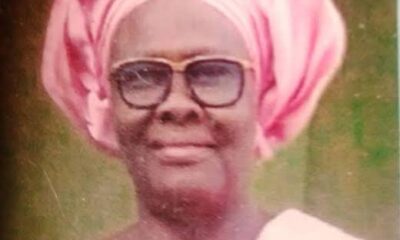Uncategorized
Human Cost of Overcrowded Boats and Night Voyages: The Sokoto Tragedy

BY EGUONO ODJEGBA
From the creeks of Bayelsa to the winding rivers of Niger, Nigeria’s waterways stretch over 10,000 kilometers—connecting 28 states and serving millions of travelers.
Yet, beneath their promise of mobility and connection lies a disturbing pattern of tragedy, driven not just by infrastructural gaps but by a widespread disregard for safety. The recent boat mishap in Sokoto’s Shagari Local Government Area, where many are feared dead, is only the latest in a string of disasters.
It marks the third such incident in Sokoto alone within a month. But this isn’t just a Sokoto story, it’s a Nigerian story and it is one we’ve heard far too often.
Beyond the headlines and rescue efforts lies a deeper, more troubling truth, which is that many of these tragedies are preventable. And while authorities scramble to respond, a quiet but deadly form of personal negligence continues to fuel the crisis, arising from personal safety consciousness and operational negligence.
Across Nigeria, boat travel is often treated with a casualness that borders on recklessness. Passengers routinely board overcrowded vessels, ignore safety briefings (when they exist), and travel at night with no navigation aids. Life jackets if available are dismissed as unnecessary or uncomfortable. Operators, too, frequently lack formal training, and boats are rarely maintained to standard.
This isn’t just about poverty or lack of access. It’s about choices. And those choices are costing lives. In riverine communities, boats are not just a convenience, they’re a lifeline. Yet, for many travelers, safety takes a back seat to urgency irrespective of increased and ongoing senmsitization by the National Inland Waterways Authority (NIWA) and its supervising Federal Ministry of Marine and Blue Economy.
State officials speaking about the Shagari mishap reported that the boat was packed with passengers, far exceeding its safe capacity. As it capsized, dozens were thrown into the river, many without any flotation devices, with the exact death toll still unknown.

This is not an isolated case. Just days earlier, another crash in Goronyo claimed multiple lives, with 25 still unaccounted for. And between July and December 2024 alone, reports indicate that over 452 people died in boat accidents across Nigeria—many under eerily similar circumstances.
Traveling by boat at night is another perilous choice that continues to cost lives. Poor visibility, lack of navigation aids, and exhausted operators make nighttime voyages a gamble with fate. Yet, many passengers still opt for these journeys, driven by urgency, habit, or misinformation.
Experts warn that the combination of overloading and night travel creates a perfect storm for disaster. “It’s not just about faulty boats or weak regulations,” says a maritime safety advocate. “It’s about the choices people make—choices that turn rivers into graveyards.”
Despite regulations from the National Inland Waterways Authority (NIWA), including a seven-year jail term for safety violations, enforcement remains weak. And while authorities bear responsibility, so too do the passengers who knowingly board unsafe vessels.
The Marine Crafts Builders Association of Nigeria (MCBAN) reports over 3,000 boat accidents in the past decade. Many stem from poor operator training, lack of maintenance, and absence of life-saving equipment. But the most heartbreaking cause is linked to human complacency.
The recurring tragedies in Sokoto and beyond are not just statistics; they are stories of mothers, fathers, children, and friends who never made it home or to their destination. And while infrastructure and policy reforms are essential, so is a cultural shift in how we approach water travel.
Travelers must begin to ask hard questions before boarding: Is this boat overloaded? Are there life jackets? Is it safe to travel at this hour? These simple decisions can mean the difference between life and death.
Until then, the rivers will continue to whisper the names of the lost, victims not just of circumstance, but more often, of choices made in haste and silence.





































